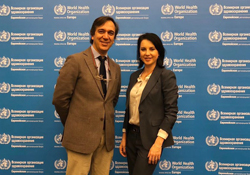Fortifying salt with iodine – a simple measure to prevent intellectual disability

WHO
Russian bloggers, media representatives and policy-makers gathered at a WHO event in Moscow to hear experts and researchers explain how iodine deficiency in pregnancy affects development of the child’s brain.
This event kicked off a social media campaign for healthy pregnancy, launched by WHO to underline the critical importance of nutrition and physical activity for pregnant women. The campaign specifically highlights the need to ensure that iodine levels are met during pregnancy to prevent the development of intellectual disabilities in children.
Iodine is a micronutrient that is difficult to obtain in a normal diet during pregnancy and infancy, given the higher requirements. The consequences are serious − iodine deficiency is the most preventable cause of brain damage and intellectual disability in children.
However, a simple and inexpensive measure can prevent such consequences. According to WHO, the recommended daily intake of iodine is best met by fortifying salt with iodine in countries where the problem of iodine deficiency is widespread.
“Iodine fortification is one of the most effective public health measures ever,” Dr João Breda, Head of the WHO European Office for the Prevention and Control of Noncommunicable Diseases (NCDs), stated. “Pregnancy is a very sensitive time for mothers and their babies. It is usually understood that a healthy pregnancy involves a balanced diet, controlling salt and sugar intake, avoiding alcohol and tobacco and staying physically active. But it is less known that the brain development of a fetus suffers greatly if the mother does not receive adequate amounts of iodine.”
Iodine is contained in foods such as fish, but is not common in the typical diets of people living in mountainous areas far from the sea. Countries with no national policies for fortifying salt with iodine have significantly higher levels of iodine deficiency. It is possible to simultaneously reduce salt consumption, which is important for the prevention of cardiovascular diseases, while ensuring that all salt is iodized at adequate levels.
A need for awareness and advocacy
In the Russian Federation, iodine fortification has been debated and new legislation to tackle iodine deficiency is being prepared. “Everyone wants to have a healthy and smart child. If we introduce this law, we will see a healthier, smarter generation in 20 years,” Dr Valentina Peterkova, Chief Paediatric Endocrinologist at the Russian Ministry of Health, stated in her presentation.
Dr Melita Vujnovic, Head of the WHO Country Office in the Russian Federation, welcomed the media’s strong interest in the topic and underscored the importance of sharing the knowledge that salt iodization is the most effective and affordable way to avoid cretinism. Furthermore, she emphasized that iodized salt has no negative effects.
The outcome of the debate in the Russian Federation is important; other countries have seen a decline in iodine deficiency problems as a result of universal salt iodization.
Preventing NCDs through healthy pregnancy – a lifelong gift from a mother to her baby
In addition to ensuring adequate iodine, a mother can help prevent her child from developing serious conditions later in life, such as cardiovascular diseases and some cancers, by maintaining a healthy diet and staying physically active. Physical activity during pregnancy can prevent lower gestational weight, reduce children’s chances of developing hypertensive disorders and prevent the onset of diabetes.
A pregnant woman should stay physically active by engaging in the 150 minutes of weekly moderate physical activity recommended by WHO, while being careful to avoid activities with a risk of trauma or falls.
Former Olympic figure skater Ms Irina Slutskaya, member of the Moscow Regional Duma, contributed to the social media campaign for healthy pregnancy by advocating for pregnant women to stay physically active. As part of the panel, she shared her personal experience: “Nordic walking, for example, can be recommended to all women before, during and after pregnancy – it is affordable and accessible for all. It improves cardiovascular health and increases time spent outdoors. I recommend all pregnant women stay physically active – dress up warmly, grab some sticks and start walking!”
Ms Slutskaya encouraged the audience of bloggers, media representatives and policy-makers to support the campaign and use the Twitter hashtag #HealthyPregnancy (#ЗдороваяБеременность in Russian) to follow information on healthy pregnancy from WHO.



